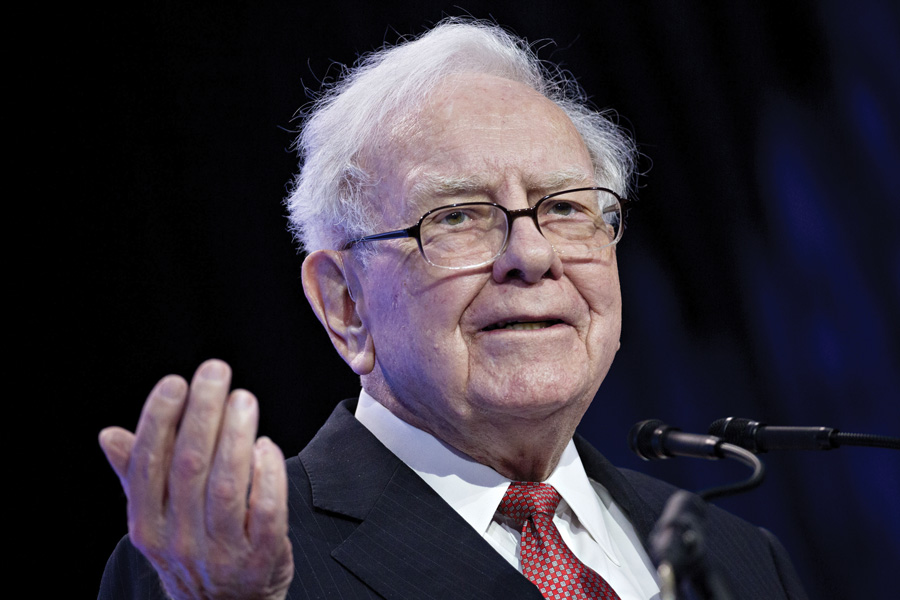

Berkshire Hathaway Inc. shares set another all-time high on Monday, pushing the market value of Warren Buffett’s conglomerate even closer to $1 trillion.
The Omaha, Nebraska-based company posted higher operating earnings, boosting a stock that’s been been crawling toward the trillion-dollar club since it notched a fresh record high last year. Surpassing that level would make Berkshire the first US company outside of the technology sector to reach such a market capitalization.
The shares gained as much as 3.1%, the biggest one-day jump since August, briefly boosting Berkshire’s market capitalization above $925 billion. The stock, which gained nearly 15% last year, was already up about 17% so far in 2024 through Friday.
“Extreme fiscal conservatism is a corporate pledge we make to those who have joined us in ownership of Berkshire,” Buffett wrote in his annual letter to shareholders. “Berkshire is built to last.”
The conglomerate reported fourth-quarter operating earnings of $8.48 billion on Saturday, versus $6.63 billion for the same period a year earlier, helped by an increase in insurance underwriting earnings and investment income amid higher interest rates and milder weather.
“Berkshire Hathaway’s earnings power should remain intact given its diverse units that can offset pockets of weakness — regardless of economic conditions,” Bloomberg Intelligence analyst Matthew Palazola wrote in a note.
Omaha-based Berkshire’s businesses range from insurance to railroads and ice cream, a stark contrast to the tech giants that currently levy such valuations. Its stock trades in two classes — the more heavily traded Class B that now goes for more than $400 per share, and its longer-standing Class A that changes hands above $600,000.
Only a few US-based companies have ever attained market capitalizations above a trillion dollars.
Apple Inc. became the first in 2018, while Microsoft Corp. recently eclipsed the $3 trillion mark. Nvidia Corp. is flirting with a $2 trillion value. Amazon.com Inc., Alphabet Inc. and Meta Platforms Inc. are also currently valued above $1 trillion, while Tesla Inc. once crossed the mark but has since slumped.
Berkshire is the closest company outside of the tech giants, but that won’t necessarily mean it’s the first. Obesity drugmaker Eli Lilly & Co. has prompted analyst questions of whether it could be the first $1 trillion bio-pharmaceutical stock, as its market-capitalization rapidly topped $700 billion.
Despite the stock gains for Buffett’s conglomerate, its diversified businesses and strong insurance results keep analysts positive.
Berkshire is “an attractive stock in an uncertain macro environment,” UBS analyst Brian Meredith wrote in a note. He holds a buy rating on shares.
Meanwhile, Berkshire’s sheer size leaves meaningful deal-making more challenging, as there “remain only a handful of companies in this country capable of truly moving the needle at Berkshire,” according to Buffett’s letter. Its cash hoard has jumped to a record at $167.6 billion as the conglomerate struggled to find transactions at attractive valuations.
“All in all, we have no possibility of eye-popping performance,” Buffett wrote.

Wells Fargo, Commonwealth, UBS are the firms losing advisor teams.

Firms are facing increasing scrutiny over whether they can be held responsible for losses by clients whose ability to understand their investments has been compromised.

Decision deepens the two firms’ decade-long relationship

Linqto Inc. was one of the first tech platforms to promise access to small investors into the high-risk, high-reward world of private investments.

Since Vis Raghavan took over the reins last year, several have jumped ship.
Stan Gregor, Chairman & CEO of Summit Financial Holdings, explores how RIAs can meet growing demand for family office-style services among mass affluent clients through tax-first planning, technology, and collaboration—positioning firms for long-term success
Chris Vizzi, Co-Founder & Partner of South Coast Investment Advisors, LLC, shares how 2025 estate tax changes—$13.99M per person—offer more than tax savings. Learn how to pass on purpose, values, and vision to unite generations and give wealth lasting meaning
